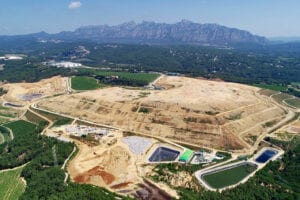The Ferrovial Servicios group, a leading global service operator, has selected Waga Energy to produce biomethane at the Can Mata landfill, one of Spain’s largest landfills, near Barcelona. The Can Mata site will be the first in Spain to use the Wagabox purification technology, developed by Waga Energy to recover landfill gas in the form of biomethane, a renewable substitute for natural gas.
The Wagabox unit at the Can Mata site will be commissioned in 2022. It will treat up to 2,200 m3/h of landfill gas and inject 70 GWh of biomethane per year into the gas network of the Spanish operator Nedgia, which is equivalent to the annual energy consumption of 14,000 Spanish households. The project will avoid the emission of 17,000 tons of CO2 per year by substituting renewable gas for natural gas.

The Can Mata landfill will be the location of the first landfill gas injection project in Europe to be financed by a long-term Power Purchase Agreement (PPA) (Source: Waga Energy)
This is the first ever landfill-gas injection project to be financed by a long-term power purchase agreement in Europe. This method of financing is common for renewable electricity projects, but rarely used for green gas projects, generally unable to provide buyers with a competitive price over the long term. This first-ever “Biomethane Purchase Agreement” has been made possible thanks to the proven efficiency of the Wagabox technology, combined with Waga Energy’s expertise in the management of landfill biogas injection projects, and Ferrovial Servicios’ experience of more than 50 years in the treatment and recovery of waste.
The two partners have adopted a business model that guarantees high performance throughout the project cycle. Waga Energy will purchase part of the landfill gas from the Can Mata site from Ferrovial Servicios, finance the construction and operation of the unit, as well as manage relations with the gas network operator and the sale of the biomethane. Waga Energy will invest 7.5 million euros to commission the unit and connect the Can Mata site to the Nedgia gas grid, located four kilometers away.
Can Mata is one of the most important waste storage sites in Spain. It produces more than 40 million cubic meters of raw biogas per year, which has so far been used in the form of electricity and fuel to power a ceramic factory. The Wagabox unit will greatly increase energy yields. Combining membrane filtration and cryogenic distillation, the Wagabox technology separates the methane contained in landfill gas for direct injection into gas grids. Ten units are already in operation in France, supplying 35,000 homes and avoiding 45,000 tons of CO2 emissions per year.
Antonio Aliana, Regional Director of Ferrovial Servicios in Catalonia, said: “The agreement signed with Waga Energy strengthens Ferrovial’s commitment to sustainable development. This circular economy project will make it possible to produce biomethane, for the benefit of our citizens, thanks to the most advanced technology for the recovery of biogas from waste gas. We hope that this innovative green energy project will be extended to other sites that we operate, as part of our strategy to transform waste into resources”.
Mathieu Lefebvre, CEO and co-founder of Waga Energy, concluded: “This significant project with the Ferrovial Servicios group marks the culmination of three years of hard work by both parties. Landfill gas-to-biomethane injection projects are complex from a technological, regulatory, and financial point of view. Our unique expertise in this area, combined to our commitment to the energy transition, have enabled this major renewable gas project in Spain to materialize. “